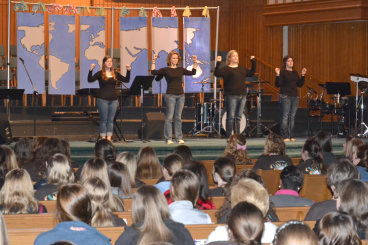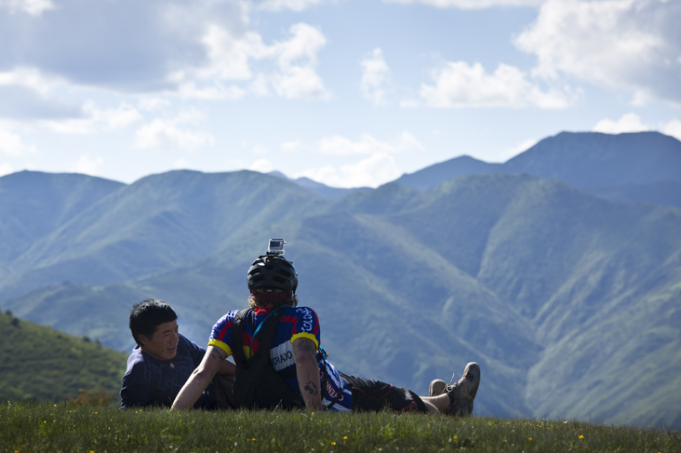As Southern Baptist disaster relief crews cleaned up from the remnants of Hurricane Frances, others were on standby to respond to Hurricane Ivan, due to make landfall by Sept. 13.
As of press time, the more than 100 Southern Baptist disaster relief units that responded to Frances were preparing to evacuate the state — again. And, more than 25 Southern Baptist units en route to the beleaguered state have been either re-routed, stopped temporarily or have returned home.
Some of the units will wait in Georgia, Alabama, North Carolina and South Carolina until Ivan clears, after which units and disaster relief volunteers will be re-deployed. But the majority of disaster relief personnel will go back home for some much needed rest before returning to Florida for the third time in less than a month.
“We’ve been stretched pretty far,” said Mickey Caison, NAMB’s disaster operations manager. “We’re doing a juggling act as things constantly change.”
Tommy Puckett, director of disaster relief for the Alabama Baptist State Board of Missions (SBOM), said, “We’ve had other hurricanes, but not of this magnitude of one right after the other and of this severity.”
Record storms, damage
Hurricane Charley struck southwest Florida Aug. 13, causing an estimated $7 billion in damage and killing 27 people. Frances hit Florida’s eastern coast Sept. 5 leaving $2 to $4 billion in damage and 15 dead. If Ivan follows suit, it would be the first time in 40 years that three hurricanes have hit Florida in one year.
Since mid-August more than 4,000 Southern Baptist Disaster Relief volunteers have given 200,000 hours of service preparing more than 1 million hot meals and completing 4,000 tree removal and cleanup projects.
Hurricane Ivan, the most powerful hurricane to hit the Caribbean in 10 years, was projected to reach the Gulf, and possibly Florida, Sept. 13 or 14. As of Sept. 10, the category 5 storm had killed 18 people, damaged 90 percent of the homes and buildings in Grenada and caused emergency officials to order the total evacuation of the Florida Keys.
Although historic in size, Frances had weakened to a Category 2 hurricane by the time it made landfall near Fort Pierce, Fla., Sept. 5. However, Frances’ 100 mph winds and heavy rains lasted for 30-plus hours as it crept across Florida and were as wide as 250 miles across.
Even so, the flooding and damage were not as bad as expected in Florida, nor in the eastern United States as Frances moved through Georgia, Alabama, the Carolinas and into Maryland, spreading rain and even tornadoes.
Once Frances moved out of Florida, 23 feeding units, along with recovery, communications, shower and laundry units moved in, ready to serve meals and clean up. The worst damage was seen in those areas hit by both Frances and Charlie.
Some state units held off on their responses, due to possible needs in their own states from Frances and Ivan. Alabama held off as well, waiting to see what damage Frances would do in the state before sending aid to Florida, Puckett said. While the needs did not materialize, the majority of Alabama’s crews remained at home to prepare for Ivan.
However, one cleanup crew from Elmore Association went to Ocala, Fla., to help after Frances and 13 Alabama Baptist chaplains went to Kissimmee, Fla., to assist crews there. They were all evacuated by Sept. 11 in preparation for Ivan.
Led by Ray Baker, associate in the SBOM’s office of chaplaincy ministries, the chaplains were assigned to feeding and cleanup crews to assist storm victims with spiritual and counseling needs.
Bill Morgan, chaplain and director of missions for Autauga Association, said the chaplains have a “ministry of presence.”
“A lot of what [chaplains] do is listen,” Morgan said. “We’re available to hear people and encourage them in their faith.” He added that the entire state of Florida seemed traumatized by the hurricanes.
Greg Walker, chaplain and youth minister at Immanuel Baptist Church, Hokes Bluff, said it was hard to evacuate. “I could see the need for chaplains, and there’s still a need,” he said. “Hopefully someone will step up and fill it.”
Puckett agreed that the need made it hard to keep Alabama’s teams at home after Frances, but it was necessary for the teams to be able to help, should Ivan hit Alabama.
“We do not want to utilize and overtire our resources if Ivan comes in our direction,” Puckett said. “If [the teams] are not needed in the state, we’ll move out to where we’re needed.”



Share with others: